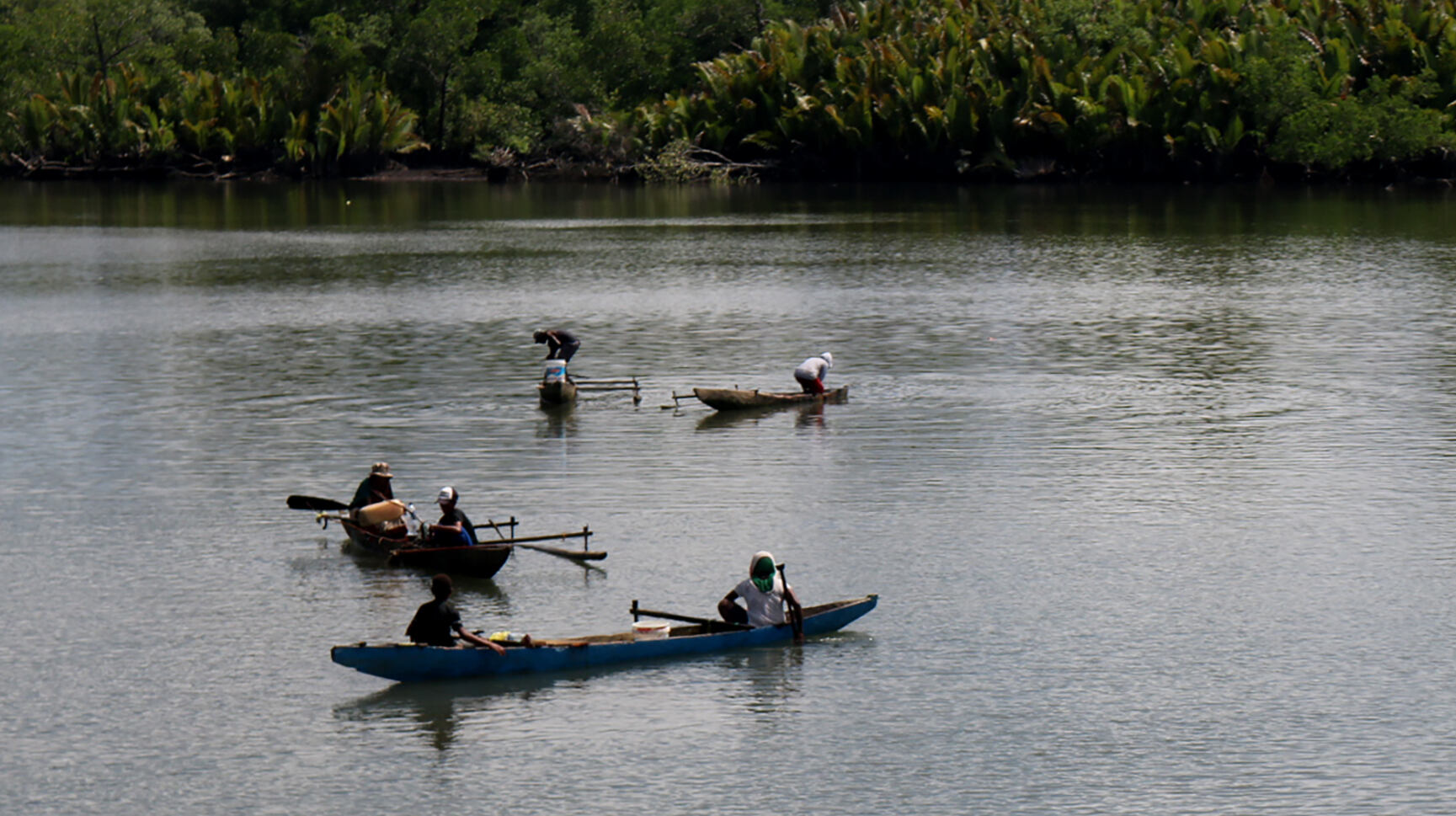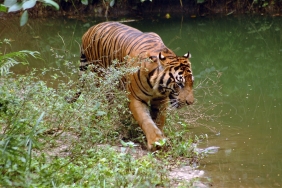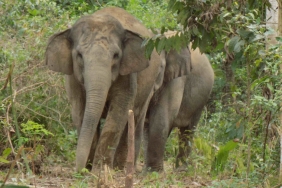POKMASWAS COMMITTED TO SAFEGUARDING SOUTH SORONG KKP
"We must involve all components of society to be involved in monitoring the wealth (potential resources of shrimp, crab and fish)," said Laurens Segetmena, when describing the duties of the members of Pokmaswas Mangewang, Konda District, South Sorong Regency.
Technical guidance as well as mentoring of Pokmaswas (Supervisory Community Groups) was carried out by WWF-Indonesia as an implementing partner of the USAID Sustainable Ecosystems Advanced (USAID SEA) Project in collaboration with the Ministry of Maritime Affairs and Fisheries and the Maritime and Fisheries Service (DKP) of West Papua Province. This activity was carried out to 2 out of 5 Pokmaswas in the Marine Protected Areas (MPA) area that had received legality by the West Papua Provincial DKP in February 2019. Previously, in December 2018 the 5 Pokmaswas had also participated in the Marine and Fisheries Resources Monitoring Training process organized by WWF-Indonesia.
Technical guidance and mentoring activities for Pokmaswas Mangewang, Konda District and Pokmaswas Knasaimos, Saifi District, were held on November 12-15, 2019. The participants consisted of 10 members of Pokmaswas Mangewang, 5 members of Pokmaswas Knasaimos and also attended by several communities around the village where the activity was held. This activity is the first step to support Pokmaswas in carrying out its duties and responsibilities in protecting the potential of marine and fisheries resources.
Pokmaswas has an important role in the process of monitoring and controlling the utilization of marine and fisheries resources in South Sorong MPA. "So far, we have been fed up with fishermen from outside the South Sorong area catching shrimp, fish, and crabs in our area without a permit.
To realize a participatory direct monitoring system by coastal communities in the South Sorong MPA, the West Papua Provincial DKP provided support for monitoring Facilities and Infrastructure (Sarpras) to 5 Pokmaswas which were delivered in October 2019. Therefore, during the technical guidance, in addition to receiving material on Pokmaswas institutions, roles, authorities and functions of supervision, Pokmaswas also gained an understanding of the use of supervisory infrastructure that has been owned by each Pokmaswas. This includes the operation of the Global Positioning System (GPS), cameras, binoculars and several techniques for documenting activities and filling in the daily monitoring logbook. Furthermore, Pokmaswas conducted a supervision simulation that began with identifying forms of violations in the MPA area and carrying out a reporting mechanism for violations encountered with the 3 M principle (Seeing, Hearing and Reporting). After understanding it, Pokmaswas immediately socialized using simple language to the local community about the importance of supervision in the South Sorong MPA area.
Surveillance Activities by Pokmaswas Mangewang and Knasaimos Mangewang and Knasaimos
Before carrying out surveillance, discussions were held to determine the route or path of direct surveillance and then divide the roles and duties of each Pokmaswas member. The process of direct supervision is carried out starting from monitoring activities in the water area carried out on open coastal land with the help of binoculars. Furthermore, direct supervision is carried out using a fleet that has been prepared and carrying complete documentation equipment and recording of surveillance activities in open water areas including cameras, GPS and others.
While conducting direct surveillance, members of Pokmaswas Mangewang documented the surveillance route with the help of GPS and marked important areas that were fishing grounds. Oktovianus Habetan, secretary of Pokmaswas Mangewang, who is usually called Otto, conducted an inspection on a fishing boat. The fishermen caught shrimp using a three-layer net fishing gear firmly while showing the type of fishing gear used to Pokmaswas members. "No sharks were caught this time," Otto added. In addition, other Pokmaswas members observed the surrounding area which is the MPA boundary area with the help of binoculars to obtain visual information.
The process of documenting every finding in the field as well as recording all activities during direct supervision at the MPA has been carried out by Pokmaswas members proficiently, including filling in the daily logbook. At the end of the supervision process, Pokmaswas evaluated the technical obstacles in conducting supervision, and developed strategies and scenarios for more effective supervision in the future. The enthusiasm of Pokmaswas Mangewang and Knasaimos members in safeguarding the potential of South Sorong MPA encourages WWF-Indonesia to further coordinate with the West Papua Provincial Government, in order to build a common commitment to combat destructive fisheries activities and Illegal Unreported Unregulated (IUU Fishing), fisheries activities that are unauthorized, not regulated by existing regulations, and not reported to existing fisheries management institutions.
The Pokmaswas commitment is shown by the existence of a routine monitoring schedule as well as incidental scenarios for information on violations in the South Sorong MPA area. The agreed routine monitoring schedule is 2 times/month for Pokmaswas Mangewang, Konda District and 4 times/month for Pokmaswas Knasaimos, Saifi District. In addition, the two Pokmaswas also appealed for the preparedness of the authorities in following up every Pokmaswas report when encountering acts of fisheries violations in the South Sorong MPA area. It is hoped that there will be a network of communication and direct coordination between stakeholders in the field of supervision, especially fisheries crime.
In order to streamline the role of Pokmaswas in ensuring the utilization pattern of marine and fisheries resources in MPAs that are free from destructive fisheries activities and acts of IUU Fishing, WWF-Indonesia seeks to provide intense technical assistance to Pokmaswas in South Sorong MPA. In addition, to ensure the role of the government or related parties in order to follow up the reporting of violations encountered in the field by Pokmaswas, WWF will also build a scheme for prosecuting fisheries violations that is connected to the West Papua Fisheries Crime Coordination Forum and integrated with the Emergency Action Plan (RAD) program for Combating Destructive Fisheries Activities in West Papua Province.





